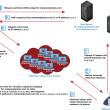The National Security Agency wants tech companies to provide it a front door access to your data so it can spy on millions of Americans and international citizens.
A battle is going on between the NSA/National Security Agency and prominent tech companies over allowing easy spying on millions of US and foreign citizens through approving front door access to encrypted data.
In March, firms like Microsoft, Google and Apple had urged Obama administration to seize NSA’s bulk collection of metadata. Conversely, NSA still propagates the idea that the government needs to track encrypted data on computer devices and smartphones in order to prevent criminal activity.

Michael S. Rogers, director NSA, has come up with a solution now. While giving speech at Princeton University, Rogers suggested that a master multi-part encryption key should be created by tech companies so that any device can be unlocked. This way, when the key gets broken into several pieces no single individual or entity would be able to utilize it.
Must Read: CIA spent years to hack iPhone, iPad, say new leaked Snowden documents
Rogers stated: “I don’t want a back door! I want a front door. And I want the front door to have multiple locks. Big locks.”
This new method was devised when Congress urged to consider a new framework for encrypted data handling. Law enforcement agencies and government officials state that total encryption is creating hindrance in the way of national security functions and operations. Tech industry leaders and advocacy groups, on the other hand, maintain that government cannot be given unobstructed and comprehensive access to private communications of the citizens.
Edward Snowden held a top-secret meeting during the South by Southwest festival this year in which he explained that it is important that tech companies take stronger position against surveillance tactics of NSA. Snowden urged that firms need to endorse highly secure technology to prevent surveillance altogether and it is also important to encourage end-to-end encryption, which means just the sender and recipient would be having access to private communications, The Washington Post reports
While Rogers maintain that “a master encryption key still creates vulnerabilities,” and “front door” access will ensure necessary security measures and keep data safe from being hacked as well. However, opponents and critics note that even when broken into several pieces, security flaws will definitely be created by a master digital key.
According to the chief cyber-security adviser at National Institute of Standards and Technologies’ Commerce Department Donna Dodson, “there’s no way to do this where you don’t have unintentional vulnerabilities.”
Image via: ShutterStock
Via: The Verge
Source: The Washington Post








